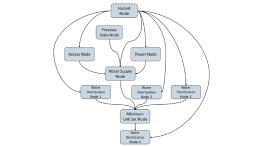Assistant Professor Cynthia Lee Co-Authors Paper Featured in Sustainable And Resilient Infrastructure
POSTED ON: May 20, 2024

Figure 1 from the publication: Simplified schematic of a branch of the CIS BN used for analysis.
Assistant Professor of Civil Engineering Cynthia Lee has been co-published in Sustainable and Resilient Infrastructure (Vol. 7, 2022 – Issue 6). The paper considers “Impacts of varying network parameters on the vulnerability and resilience of interdependent critical infrastructure systems.”
You can read more about the research here.
ABSTRACT
Critical infrastructure systems are complex and subjected to evolving risks and hazards, which makes anticipating their behavior difficult. To prioritize among actions that increase system resilience, it is critical to understand their impacts on parameters defining a network and on anticipated network performance. In this paper, the authors investigate the impacts of variations in three parameters on network vulnerability: component vulnerabilities, service interdependency redundancies, and system link configuration. The advances of this work compared to prior studies include: 1) The impacts of parameters varied across a range of values at the component level are evaluated considering component functionality and connectivity; 2) quantitative analyses of component performance as parameters vary are investigated based on system redundancies; and 3) probabilistic system interdependencies are analyzed through a Bayesian network that considers component pathways. Results quantify effects of changes in component vulnerabilities and dependencies and are used to discuss impacts on system resilience.




